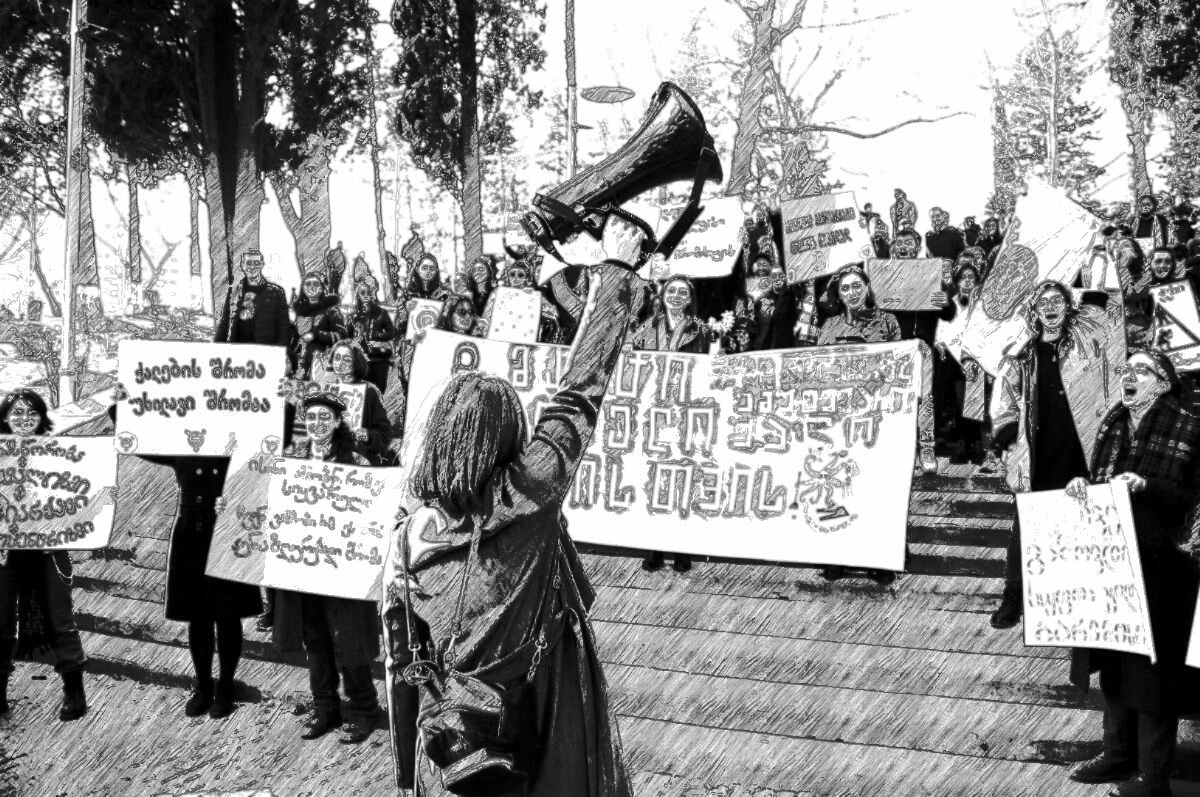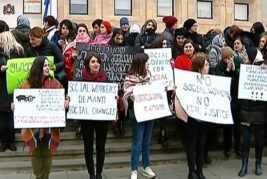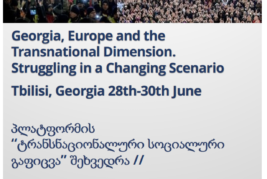
Translations: ქართული – French – Italian
Georgia is connected to the European Union by an Association Agreement that is being implemented since 2016. Almost unnoticed in the West, the agreement entails a plan of reforms of economy, society and public policies that is shaking the Georgian political landscape. As other countries today and in the past, Georgia is meant to match European “democratic standards”, strengthening the market economy, creating a business-friendly environment, changing its visa policy and tightening border patrol. After a war and almost two decades of savage neoliberal reforms, that have deserted labor and social rights, now the EU intervenes with the aim of promoting stability in favor of business expansion.
We think what happens today in Georgia is telling of the transnational and global dimension of contemporary politics. Georgia is through and through integrated in a transnational scenario. More than half a million Georgian women work in Europe, mostly in the private care sector, covering the lack of basic welfare benefits and sending home remittances that are a crucial part of the national economy. Major infrastructural plans linked to the Belt and Road initiative and European TEN-T network are portraying the country as a crucial transit zone between Asia and Europe, and a country-wide tax-free economic zone is created to attract foreign investments; financial institutions control the lives of hundreds of thousand Georgians who got indebted in order to be able to satisfy their most basic needs, while EU backed financial institutions have been key to the European intervention in the country. Currently Georgia is the first recipient of European Bank for Reconstruction and Development (EBRD) funds, these, alongside investments from the European Investment Bank have contributed to fuelling a spree of investment in infrastructural projects, resting on a legislation that places investors at the highest point of the chain, protecting their perceived rights against the most basic workers rights and placing the state as a guarantor for profit. Even if the industrial conversion of Georgia seems still not in sight, the reproduction of Georgian society is in multiple ways connected with transnational dynamics that make any attack to the prospect of a EU integration on the basis of a national closure politically useless.
Georgia is not in the EU, but the Association Agreement with the EU is producing real effects: references to the agreement are systematically used by the government, the NGOs taking care of the alleged “democratic transition” and the major trade unions to channel labor and social struggles into a more controlled and benign form. In this way, the Agreement is suspending the political time and erasing the present in sight of a supposedly better future. It goes without saying that this future is being built completely above the heads of those who are going to be affected. The right to strike is under attack in Georgia as everywhere, but here the EU Association Agreement plays a specific role: the strike is pictured as a barbaric weapon, not fitting the civilized dialogue between the social partners, while the central European model of co-management between unions and enterprises is presented as the key to the Georgian dream. The very negotiation model that has tried to rule out the possibility to strike in the EU member states is one of the pillars of the EU enlargement towards East.
The Agreement with the EU assumes that reforms will be accepted silently by Georgian workers, women and men, because the market democracy and the prospect of becoming a reservoir of migrant and cheap labor is the best they can expect. The plan of infrastructural investment in the region echoes the infrastructural hype that lies behind great projects all across the globe, making Central Asia a junction for future developments that will affect the East as well the West, and looms as a blackmail and a warning: the environment is business friendly only if there is social peace, only if those who populate it do not talk to each other, do not advance common claims. This shows at the highest magnitude how the logistics of exploitation builds its own environment upon the fragmentation of workers’ collective power. The question is therefore how to build workers’ power in this situation, and the similar situations that constellate the transnational space, without letting the legalistic perspective of the agreement between governments own the monopoly on the present and mortgage the future.
This question does not simply concern Georgia as such: we believe that this poses us new problems when addressing the central issue of how to organize transnationally. This shows how a new EU ‘business acquis’, while imposes neoliberal reforms in the West is extending its transnational grip across the East and the Balkan region. While shaken by deep political crisis – see the Brexit negotiation or the French insurrection –, the EU is continuing its structural integration and enlargement process. This process goes hand in hand with the erosion of rights and of welfare benefits and the general precarization of labor that is by now a reality in every member State. In order to forge a transnational strategy, without chasing nation-based illusions, we need to gain a political understanding of this process and how it affects our capacity to strike and struggle, in order to turn the transnational dimension into a source of force instead of weakness. It is for these reasons that, after holding the first meeting in Poznan to foster the participation from the Eastern countries of Europe and meetings in several European capitals, we decided to hold a meeting in Georgia to enlarge the scope of the TSS to the outsides/insides of the EU.
Moreover, in Tbilisi we will discuss the political use of the strike in the context of Georgia as a means to take back the initiative in workplaces and society and bridge the borders between sectors and countries. In this we rely on ongoing movements that have a strong transnational character: the feminist strike, that has set in motion mobilizations in dozens of countries all over the world starting from the fact that the sexual division of labor and male violence against women are not national, but global facts. Migrants are daily living a transnational reality by crossing the borders and posted and care workers are daily using their mobility to take advantage of wage differentials. Nurses in Bulgaria recently went on strike in more than 30 cities declaring that if the government does not grant better working conditions, they will leave the country. Industrial workers in the foreign factories located in Eastern European countries, transport workers and social workers are striking and fighting against the policies that populist governments are enforcing for the sake of foreign investments, as the protests in Hungary against the slave law show. New experiments of transnational coordination between Amazon warehouses in several European countries are taking place that could build a model for organizing against multinational companies. Starting from this mobile situation, and placing our discussion in a country where pressures from the West merge with pressures from the East to impose a new logistics of exploitation, we want to discuss what tools and strategy are needed to produce and give a common direction to our transnational communication.
PROVISIONAL PROGRAM:
Friday 28th of June
5pm-5.30pm: Welcome and introduction
6pm-8pm: Roundtable
“Georgia, Europe and the Transnational Dimension: Struggling in a Changing Scenario”
Saturday 29th of June
*Morning session*
10am-1pm: Workshop #1
“Rethinking the strike: experiments, conflicts and organizing in Georgia, Europe and beyond”
1pm-2pm: Lunch break
*Afternoon session*
2pm-4.30pm: Workshop #2
“Global Women’s Strike”
5pm-7pm: Final Plenary
“Building a transnational strategy against exploitation and impoverishment”
Sunday 30th of June
11am-3pm: TSS Platform Coordination Meeting
A more detailed program will be published soon. Stay tuned!





